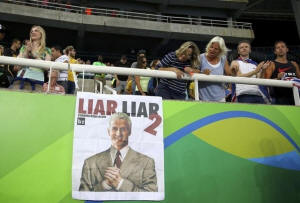|
U.S.
swimmers' tall tale touches a raw nerve in Brazil
 Send a link to a friend
Send a link to a friend
 [August 20, 2016]
By Daniel Flynn and Brad Brooks [August 20, 2016]
By Daniel Flynn and Brad Brooks
RIO DE JANEIRO (Reuters) - When an
angry crowd of Brazilians jeered U.S. Olympic gold medal swimmers
Gunnar Bentz and Jack Conger, calling them 'liars' and giving one of
them a tug on the ear, the young Americans looked shocked by the
ferocity of their reaction.
What they appeared not to realize was that a fabricated story about
how they and two team mates had been robbed at gunpoint - allegedly
told to cover up an act of vandalism at a Rio gas station - hit a
raw nerve in this South American nation.
Brazilians are deeply proud of their country - its infectious music,
sun-kissed beaches, five World Cup victories and its status as a
regional heavyweight - but are acutely aware of its problems:
deep-rooted corruption, poverty and the crime that stalks the slums
of its megacities, like Rio de Janeiro.
Brazil looks northward to the United States - like itself, a big
country built on successive waves of immigration - with a mixture of
respect, admiration, envy and resentment.
The complicated relationship has led to episodes - some minor,
others deadly - involving Americans flaunting Brazilian law to the
ire of those living here. The swimmers' scandal neatly fits Brazil's
stereotypical view of "Ugly Americans".

"Brazil is a country that already has an inferiority complex when it
comes to the United States," said Esther Solano, a sociologist at
the Federal University of Sao Paulo who was in Rio for the Games.
"So people here feel vulnerable and angry when Americans come down
here and act like they can do whatever they want, with no respect
for rules or regard for the locals."
BRAZIL'S COMING OF AGE
In 2009, when Brazil was chosen to host the Games, the economy was
booming. The then president, Luiz Inacio Lula da Silva, said it
showed Brazil had become a "first-class" country.
But as the Games finally arrived, preparations were immersed in a
corruption scandal over infrastructure and criticism over failures
to clean up the raw sewage pouring into Guanabara bay.
The two weeks of competition were overshadowed by armed robberies of
foreign government ministers, athletes and tourists, as well as long
queues at stadiums and lack of food.
The American swimmers' allegations appeared to be the final
humiliation.
When their fabrication was uncovered, the immediate reaction of many
here was "imagine what would happen to a Brazilian if they did that
in the U.S.?". It was a question posted by legions of Brazilians on
social media in recent days.

"The impression is that they arrived thinking this was a country
without law and that they could do whatever they wanted and get away
with it," said Marcelo Vieira, 33, in the Olympic Park.
Yet Brazilians also showed their playful side. Memes involving gold
medal swimmer Ryan Lochte, accused by police of being the
"protagonist" of the vandalism and ensuing lie, flooded Facebook
feeds and Twitter, many depicting him as fiction's most famous liar,
Pinocchio.
[to top of second column] |

A poster showing a likeness of Ryan Lochte (USA) of USA is seen at
the stadium. REUTERS/Dominic Ebenbichler

"Those of us living in Rio are used to gunfire, assaults, with
everything that is bad," said Paulo Henrique Cunha, a 73-year-old
accountant. "But to have these gringos show up and invent this story
they were robbed? Ah, that's just too much."
MEDALS ARE FOR HONOR
The Brazilian government has never backed down from taking on
Washington, from trade complaints to visa policy.
Brazil requires American tourists to have visas and that they cost
the same as Brazilians pay to visit the United States
In 2004, Brazil implemented a policy of fingerprinting and
photographing American tourists on arrival, in response to the
United States doing the same for all foreigners entering America
after the Sept. 11 attacks.
A few weeks after Brazil's policy took effect, an American Airlines
pilot was arrested at Rio's airport because he made an obscene
gesture with his middle finger while being photographed.
The photo of the pilot, Dale Hirsch, was printed above the fold in
Rio's main O Globo newspaper - and was widely perceived as the
embodiment of American arrogance.
The pilot was freed after paying a fine of $13,000 to avoid the
possibility of facing two years in prison for showing "contempt for
authorities" - a crime in Brazil.

On Friday, the swimmer Lochte issued an apology on his Twitter
account, but it did little to quell the anger.
It was blasted on social media by Brazilians and Americans alike as
a lukewarm, half-hearted mea culpa, doubly so as it contained a line
about it being "traumatic" to be out partying in a foreign country
where one does not speak the language.
"Medals are for honor," one person wrote on Twitter directly
responding to Lochte's post, referring to the 12 he has won at four
Olympics. "Lochte has none."
(Additional reporting by Paulo Prada, Caio Saad, Eduardo Simoes,
Anthony Boadle and Clive McKeef; Writing by Daniel Flynn and Brad
Brooks)
[© 2016 Thomson Reuters. All rights
reserved.]
Copyright 2016 Reuters. All rights reserved. This material may not be published,
broadcast, rewritten or redistributed. |